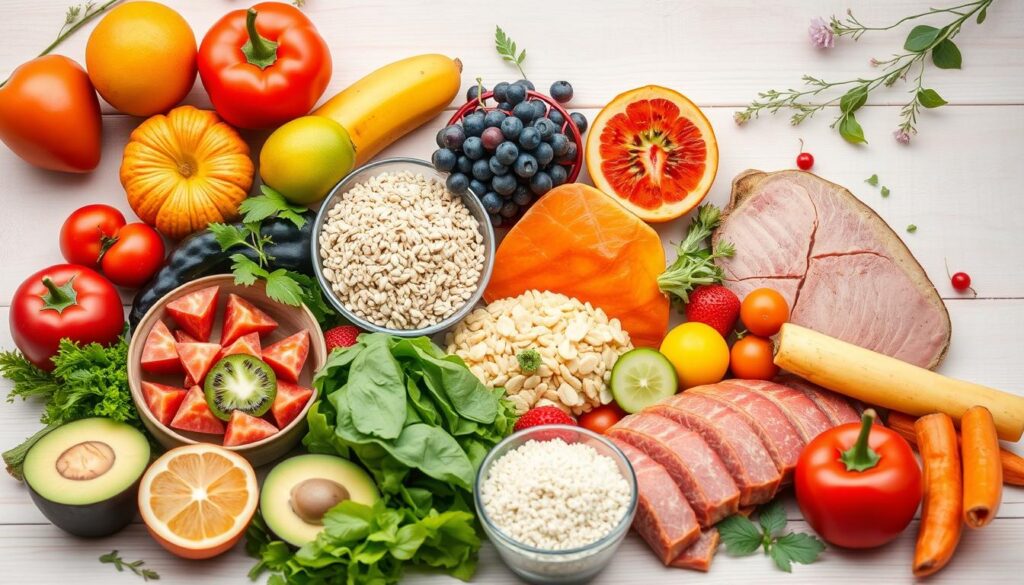Physical Address
304 North Cardinal St.
Dorchester Center, MA 02124
Physical Address
304 North Cardinal St.
Dorchester Center, MA 02124

Starting a weight loss journey can feel overwhelming. There are many diet plans claiming to help you lose weight fast. This guide will look at the top10 best diet plans for healthy weight loss. We’ll cover the Mediterranean Diet, DASH Diet, and plant-based diets, among others.
We’ll talk about how each diet works, its health benefits, and any possible drawbacks1. We’ll also compare weight loss programs and diets, and share the best diet rankings. This article aims to help you choose the right diet for your health goals and lifestyle.
The Mediterranean diet is based on the eating habits of Italy and Greece2. It focuses on vegetables, fruits, whole grains, nuts, legumes, and olive oil. You should eat poultry, eggs, and dairy in moderation, but limit red meat. Avoid refined grains, trans fats, processed meats, and added sugars.
This diet encourages eating fruits, vegetables, whole grains, legumes, nuts, and seeds2. It also promotes heart-healthy fats2. Foods to limit include added sugars, refined grains, trans fats, processed meat, and highly processed foods2. Healthy snacks include nuts, fruits, vegetables with hummus, Greek yogurt, hard-boiled eggs, and cottage cheese2.
Studies show the Mediterranean diet can help reduce the risk of multiple chronic diseases, including heart disease, certain cancers, and cognitive decline3. Its emphasis on minimally processed, plant-based foods with healthy fats has been linked to weight loss and improved longevity3.
The Mediterranean diet promotes heart health, supports balanced blood sugar levels, promotes gut health, protects brain function and cognition, and promotes weight loss and maintenance4. Numerous studies have demonstrated that the Mediterranean diet reduces the risk of chronic conditions4.
In addition to weight loss and disease prevention, the Mediterranean diet has also been associated with decreased risk of mental disorders like depression and cognitive decline3. Eating less meat on this diet can also promote environmental sustainability3.
Since the Mediterranean diet is low in dairy, it’s important to ensure adequate intake of calcium and vitamin D from other sources3. Some people may also find the diet restrictive in terms of limiting processed foods and red meat3.
The Mediterranean diet has been named the healthiest diet for six consecutive years4. Research has suggested that people in Mediterranean regions tend to be healthier and have a lower risk of chronic conditions compared to those following a standard American diet2.
| Dietary Component | Recommended Intake |
|---|---|
| Fruits and Vegetables | Daily |
| Whole Grains | Daily |
| Legumes | Several times per week |
| Nuts and Seeds | Daily |
| Olive Oil | Primary Fat Source |
| Fish and Seafood | 2-3 Times per week |
| Poultry | In Moderation |
| Dairy | In Moderation |
| Red Meat | Rarely |
| Processed Foods | Limit Intake |
| Added Sugars | Limit Intake |
The Mediterranean diet is rich in whole foods like whole grains, vegetables, fruits, legumes, nuts, seeds, and heart-healthy fats4. It limits processed foods, red meat, added sugar, and refined grains4. The diet encourages lifestyle factors like community, movement, and purpose4.
Whole grains in the Mediterranean diet provide fiber through components like cellulose, lignin, hemicellulose, pectin, fructans, beta-glucans, gums, psyllium, polydextrose, polyols, and resistant starches4. Specific sources of each fiber type are listed4. Whole grains in the Mediterranean diet include barley, brown rice, bulgur, quinoa, and others4.
Vegetables in the Mediterranean diet are recommended to be cooked for increased nutritional availability4. Seasonal fruits and vegetables are encouraged in the Mediterranean diet4. Legumes in the Mediterranean diet provide fiber, satiety, and comfort4. Seafood is highlighted as a key component of the Mediterranean diet4.
“The Mediterranean diet was recommended by dietitians as a maintainable and enjoyable option that meets nutritional needs.”3
The Mediterranean diet has been linked to benefits such as weight loss and promoting heart health2. Studies suggest that the Mediterranean diet may be a good long-term option for managing weight, with individuals following it being less likely to gain excess weight over time2. The American Heart Association recommends the Mediterranean diet as an evidence-driven option for preventing cardiovascular disease and stroke2.
Some studies have shown that the Mediterranean diet is more effective than a low-fat diet at slowing the progression of plaque buildup in the arteries, a major risk factor for heart disease234.
The DASH (Dietary Approaches to Stop Hypertension) diet is designed to help treat or prevent high blood pressure. Research has shown the DASH diet can significantly reduce blood pressure levels and lower the risk of heart56. It focuses on eating lots of fruits, vegetables, whole grains, and lean meats. It also limits salt, red meat, added sugars, and unhealthy fats5.
The DASH diet suggests a maximum sodium intake of 1500 – 2300 mg per day6. It emphasizes natural foods high in potassium and magnesium to lower blood pressure6. It includes fruits, vegetables, whole grains, lean protein, and low-fat dairy. It limits sugar-sweetened beverages and desserts6.
Studies show the DASH diet may aid in weight loss and lower cancer risk5. It has led to a 27% lower stroke rate and a 15% decrease in heart disease rate6. It has been successful in reducing high blood pressure, improving diabetes health, and aiding in weight loss6.
The DASH diet also reduces depression risk. Even moderate adherence can lower depression risk over time5. It’s known for reducing blood pressure without medication6. Resources for following the DASH Diet, like recipes and meal plans, are free6.
“The DASH-style eating plan received praise for being low in salt, added sugar, alcohol, and processed foods, while rich in vegetables, fruits, whole grains, legumes, and lean proteins.”
| Dietary Pattern | Score Range | Description |
|---|---|---|
| Tier 1 | Above 85 | Highest-rated eating plans, including the DASH-style diet |
| Tier 2 | 75-85 | Vegan and low-fat diets, emphasizing plant-based foods and limiting added sugars |
| Tier 3 | 55-74 | Very low-fat and low-carb diets, showing moderate alignment with the American Heart Association’s guidance |
The DASH diet is the #1 diet overall by US News & World Report for 8 years. It scored 4.2 out of 5 in 20206. The original DASH Diet study has been cited nearly 6,000 times since 19976.
The DASH diet is good for those with high blood pressure or salt sensitivity7. Reducing salt intake can lower blood pressure in certain groups7. But eating too little salt can cause health problems like heart disease and low blood sodium levels756.
In recent years, plant-based diets have become more popular. People choose them for many reasons8. Vegetarian diets, which exclude meat, poultry, and fish, offer health benefits. These include a lower risk of diabetes, heart disease, and some cancers, and may help with weight loss8.
The vegan diet doesn’t include any animal products, like meats, eggs, and dairy8. Lacto-vegetarians eat mostly plants but also include dairy for extra protein8. The flexitarian diet is more flexible. It allows for meat and animal products but in smaller amounts and less often than usual8.
Plant-based diets can greatly improve health. They lower the risk of diseases like type 2 diabetes and improve metabolic health8. The flexitarian diet is also good for weight loss and blood pressure8.
Plant-based diets are better for the environment. They reduce greenhouse gas emissions, deforestation, and soil degradation8. The sustainatarian diet aims to reduce food waste and animal product consumption. It focuses on local produce and might include hunting for meat8.
While plant-based diets are healthy and good for the planet, they can be hard to follow for some8. Veganism and vegetarianism might feel too restrictive and require big lifestyle changes8. The flexitarian diet’s flexibility can be both a plus and a minus, depending on how it’s followed8.
| Diet | Overview | Health Benefits | Environmental Impact |
|---|---|---|---|
| Vegan | Excludes all animal products, including meat, poultry, fish, eggs, and dairy. | High in fiber, low in saturated fat, associated with reduced risk of chronic diseases. | Significantly reduces greenhouse gas emissions, deforestation, and soil degradation. |
| Lacto-vegetarian | Primarily plant-based, but includes dairy products like milk, butter, cheese, yogurt, and ice cream. | Provides additional protein from dairy, while still offering health benefits of a plant-based diet. | Relatively lower environmental impact compared to diets including meat, but higher than vegan. |
| Flexitarian | Mostly plant-based, but allows for occasional consumption of meat and other animal products in smaller quantities. | Linked to weight loss, better blood pressure, and reduced risk of chronic diseases. | Reduced environmental impact compared to a traditional meat-heavy diet, but higher than strictly plant-based diets. |
“The Mediterranean diet has topped the best overall diet list for 7 consecutive years, ranking first in six out of the ten categories, including best diet for diabetes and best heart-healthy diet.”9
The MIND diet combines the Mediterranean and DASH diets for brain health10. It focuses on green leafy veggies, berries, nuts, olive oil, and whole grains. It limits red meat, butter, and fried foods11.
The MIND diet highlights healthy foods and limits unhealthy ones11. It’s flexible and doesn’t require strict following for brain benefits11. It’s about making lifestyle changes, not strict rules11.
Research shows the MIND diet can lower Alzheimer’s risk and slow cognitive decline in older adults.1012 It may also delay Parkinson’s onset10. The diet’s focus on berries and fish makes it unique. It protects against cognitive decline and promotes overall health11.

“The MIND diet not only protects against cognitive decline and Alzheimer’s but also promotes overall health and cardiovascular benefits.”
This article covers the top10 best diet plans for healthy weight loss and better health. You’ll find diets like the Mediterranean Diet, DASH Diet, and plant-based diets. Each diet has its own benefits and challenges, so choose the one that suits you best.
In 2020, the keto diet was the most searched diet in the U.S13.. People on the paleo diet eat mostly lean animal foods and veggies13. Many thought gluten-free foods were healthier back then, and Beyonce used the Master Cleanse to lose weight for Dreamgirls13. The Whole30 focuses on healthy foods for 30 days, avoiding certain foods13.
During the low-fat craze, people ate low-fat foods to lose weight13. The Special K diet aimed to help people lose weight by eating Special K for breakfast and lunch13.
U.S. News & World Report 2024 ranked the best diets. WeightWatchers and the Mediterranean Diet are at the top14. The Mayo Clinic Diet offers different menus, and Noom Weight has daily lessons14. Optavia is also a top diet, focusing on small meals and healthy eating14.
The Mediterranean Diet was ranked #1 in 202215. The DASH Diet and Flexitarian Diet tied for second15. The MIND Diet ranked fourth for preventing Alzheimer’s15. Weight Watchers Diet was ranked #1 for weight loss15. The Vegetarian Diet ranked #9 overall and #3 in plant-based diets15.
Choosing between a weight loss program and a diet can be tough. Both aim for effective and lasting weight loss. Yet, they differ in their approach16.
Weight loss programs offer a structured way to manage weight. They stand out because of:
Diets, on the other hand, focus on specific eating patterns. They might work short-term but programs offer a more complete approach17.

Choosing a program means looking at what you prefer, your budget, and the program’s success. Reliable sources like the National Institutes of Health and U.S. News & World Report offer insights17.
“The most successful weight loss programs are those that help individuals make lasting lifestyle changes, not just temporary fixes.”
Knowing the differences between programs and diets helps make better choices. This leads to lasting and effective weight loss1617.
U.S. News & World Report releases annual rankings for the best weight loss diets. For 2024, the top diets include WeightWatchers, the Mediterranean diet, and the Volumetrics diet. Also, the Mayo Clinic Diet, the DASH diet, the Flexitarian diet, Noom Weight, the Vegan diet, the Keto diet, and the Atkins diet are among the best18.
The Mediterranean diet and the DASH diet are the best overall diets for 2024. They are followed by the MIND diet, the Mayo Clinic Diet, and the Flexitarian diet. WeightWatchers, the Volumetrics diet, Dr. Weil’s Anti-Inflammatory diet, and the TLC diet also rank high19.
The Mediterranean diet focuses on heart-healthy fats, fruits, vegetables, and whole grains. It’s known for weight loss and overall health. Studies show it can lead to a 5-10% weight loss in 12 months18. It also helps people keep weight off after losing a lot18.
The DASH diet is great for lowering blood pressure and losing weight. Obese older adults on the DASH diet lost weight and body fat, with many health benefits18.
Diets like WeightWatchers, Noom Weight, and Vegan diets are also effective for weight loss. WeightWatchers helps people lose 10% of their body weight in 6 months, eight times more than without it18. Vegan diets can also lead to weight loss if you eat high-quality plant-based foods18.
The Flexitarian diet, which includes some meat, has fewer cases of metabolic syndrome than regular meat eaters18. Intermittent fasting can also help with weight loss and increase metabolism18.
The Volumetrics diet focuses on low-energy-density foods for weight loss18. Overweight and obese adults lost 26 lbs on a plant-based diet for six months18. The Mayo Clinic Diet teaches lifestyle changes, portion control, and healthy food choices for weight loss18.
U.S. News & World Report’s rankings give a detailed look at the best diets for 2024. Whether you want to lose weight or eat healthier, these diets offer effective and sustainable options.
Several weight loss programs have become well-known for their effective methods. The WeightWatchers Points Program, the Mayo Clinic Diet, and Noom Weight are among the most recognized. They offer different approaches to help you lose weight.
The WeightWatchers Points Program gives foods a “point value” based on calories, sugar, and protein. You get a points budget to spend on foods you track in the app. Studies show it works for both short and long-term weight loss20.
WeightWatchers has two plans. The basic membership starts at $23 a month, and the membership plus workout plan is $45 a month20.
The Mayo Clinic Diet teaches healthy eating and portion control for long-term weight management. It has two phases: “Lose It!” and “Live It!” to help you change your habits. It focuses on eating lots of low-calorie, high-volume foods like veggies and fruits21.
The Mayo Clinic Diet was created by doctors, dietitians, and psychologists. It offers a 12-week program for weight loss and a healthy lifestyle21.
Noom Weight is a virtual program that uses psychology for weight loss. It offers personalized plans, daily lessons, and coaching to change your food relationship and build healthy habits21. Noom costs about $70 a month, with a discount for a three-month commitment at $15920.
These programs offer different ways to lose weight. WeightWatchers uses points, the Mayo Clinic Diet focuses on lifestyle changes, and Noom uses psychology. Knowing what each program offers helps you choose the best one for your goals.

Nutrisystem is a meal delivery service that offers pre-packaged meals and snacks. It helps users lose weight by controlling portions and keeping nutrition balanced22. The diet focuses on low-calorie, high-protein foods to ensure users get enough nutrients.
The South Beach Diet is all about eating more protein and healthy fats. It limits carbs to help burn fat for energy23. This diet distinguishes between good and bad fats to aid in weight loss.
Vegetarian and vegan diets exclude animal products. A whole food plant-based diet goes further by avoiding processed foods and sugars1. These diets can lower the risk of chronic diseases and improve heart health. However, they might require supplements for some nutrients.
Low-carb diets, like Keto and Atkins, focus on high-protein and high-fat foods. They restrict carbs to enter ketosis, where the body burns fat23. These diets can lead to quick weight loss but raise concerns about heart health and nutrient deficiencies.
The Mediterranean Diet is rich in vegetables, fruits, whole grains, nuts, and olive oil1. It allows for dairy, poultry, and fish in moderation but limits red meat and processed foods.
The DASH Diet is a low-sodium plan to lower blood pressure and improve heart health23. It emphasizes fruits, vegetables, whole grains, and lean proteins while restricting salt, red meat, and added sugars.
Intermittent fasting involves alternating eating and fasting periods23. Popular methods include the 16/8 schedule and the 5/2 method. It may offer health benefits like better blood pressure and protection against chronic diseases. However, it might not be right for everyone, especially those with eating disorders or certain medical conditions.
“About four in 10 Americans regularly set resolutions, with improved diet being one of the top five resolutions each year.”22
| Diet/Program | Key Characteristics | Potential Benefits | Potential Drawbacks |
|---|---|---|---|
| Nutrisystem | Meal delivery service with pre-portioned, low-calorie meals | Convenient, calorie-controlled meals, potential for weight loss | May lack flexibility, potential for nutrient deficiencies if not supplemented |
| South Beach Diet | Low-carb, high-protein, healthy fat focus | Potential for weight loss, improved blood sugar control | May be challenging to maintain long-term, potential for nutrient deficiencies |
| Vegetarian/Vegan/Whole Food Plant-Based | Eliminate animal products, focus on whole, unprocessed plant-based foods | Reduced risk of chronic diseases, improved heart health | May require supplementation for certain nutrients, may be challenging to follow long-term |
| Low-Carb Diets (Keto, Atkins) | Restrict carbohydrates, emphasize high-protein and high-fat foods | Potential for rapid weight loss, improved blood sugar control | Concerns about long-term heart health, potential for nutrient deficiencies |
| Mediterranean Diet | Plant-based, emphasis on healthy fats, moderate consumption of dairy, poultry, and fish | Reduced risk of chronic diseases, improved heart health, potential for weight loss | May require adjustments to personal food preferences |
| DASH Diet | Low-sodium, focus on fruits, vegetables, whole grains, and lean proteins | Reduced blood pressure, improved cardiovascular health | May be challenging to follow long-term, potential for lack of variety |
| Intermittent Fasting | Cycling between periods of eating and fasting | Potential for improved blood pressure, protection against chronic diseases | May not be suitable for everyone, especially those with a history of eating disorders or certain medical conditions |
This article has covered the top10 best diet plans for healthy weight loss and better health. We looked at the Mediterranean Diet, DASH Diet, and more. Each diet has its own benefits and things to consider24.
A survey by Forbes Health found that 45% of people gave up on diets because they didn’t like the food. It’s key to pick a diet that fits your life and tastes. This way, you can stick to it for the long run25.
For lasting health benefits, a diet that you can keep up with is best. Diets like Paleo and keto were ranked lower because they’re hard to follow. They also limit foods too much.
25 The Mediterranean diet and Weight Watchers (WW) were the top picks for weight loss. The Flexitarian diet and DASH diet also did well. They were great for plant-based diets, family meals, and heart health.
By learning about these diets, you can choose the best one for you. This is the first step to a healthier, more enjoyable diet.
26 Eating foods like eggs, leafy greens, and salmon can help you lose weight. Adding cinnamon, ginger, beans, and legumes to your diet can also improve your health. This article has shown many diet options for a balanced and lasting healthy lifestyle.